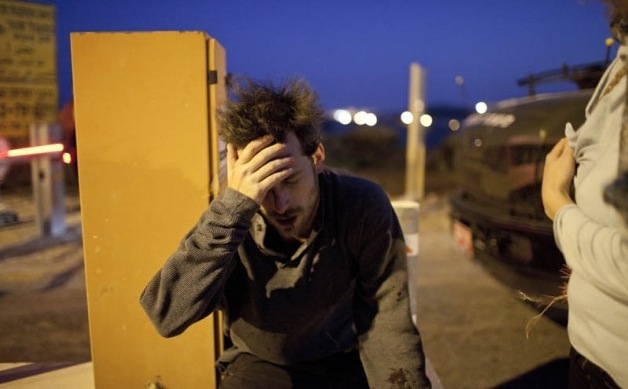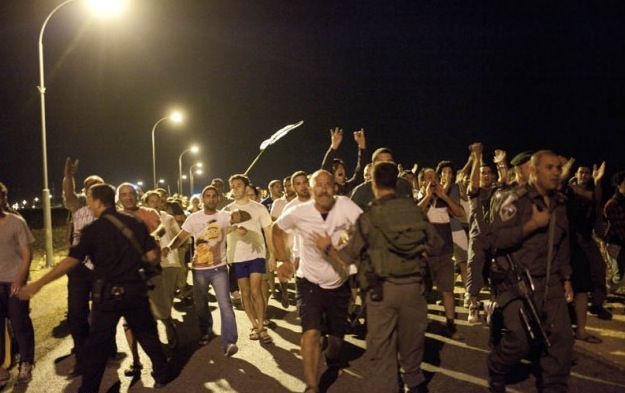This is the second part of David Shulman’s report on the West Bank since the Palestinian bid for statehood. Part one was posted here.
There are tragic internal concomitants to the dramatic political failure at the top in Israel. That failure and the moral pathology that motivates it are more and more seeping down into the Israeli grass roots; or maybe they have been festering there for years, fed by the occupation and its cruelties. Ehud Barak used to say that when a truly moderate Palestinian leadership would arise, the demand to make peace would well up from below in Israel and force the government to act in this direction. Evidently, he was wrong. Consider what happened on the second day of Rosh Hashana, Friday, September 30, in the settlement known as Anatot, just north of Jerusalem.
It began with a visit by a small group of about 15 Israeli peace activists, mostly from the Sheikh Jarrah Solidarity Movement and Ta’ayush, to Yasin Abu-Saleh al-Rifa’i, a Palestinian who owns a plot of land that, to his misfortune, has been included in the area of this large Israeli settlement, which was founded in 1982 and now has a population of nearly 1,000. The Israeli courts have repeatedly confirmed al-Rifa’i’s title to this land, and over the years he has tried to keep his claim alive by planting olive trees there—which are always uprooted immediately by the settlers—and by making continuous visits to the site. (Under Israeli law, land that is not cultivated by its owner for three consecutive years reverts to the state.) Al-Rifa’i and his wife have been repeatedly threatened and sometimes viciously attacked by settlers.
On the morning of September 30, the activists accompanied him to the rocky hillside that is still nominally his; they were carrying with them a Palestinian flag. The Anatot settlers seemed to have known ahead of time about the visit, and within minutes, a large contingent of them—estimates range from 60 to 100—arrived and attacked the group. First they cracked open Yasin’s head and attacked his wife, breaking her ribs, and then they beat the Israeli activists with clubs and rocks. Many were injured; four were hospitalized (Yasin himself is still recuperating), and, as usual, some activists—in this case three of them—were arrested (generally, settlers are above the law). There were uniformed Israeli police there—some were present on the scene ever before the attack began—who made no effort to stop the assault. There is no question that the attack was premeditated, and its scale was impressive. Cameras documenting the violence were smashed by settlers and police; vehicles belonging to activists and Palestinians parked nearby were savaged.
At 6 PM a protest demonstration by some forty peace activists (including participants in the earlier confrontation and others) began outside Anatot, and the scenes of the morning repeated themselves. This time the settler mob was many times larger; they were in a fury, hankering for a fight, chanting “Death to Arabs” and “Death to leftists.” The attacks are well documented; among other horrific scenes recorded on YouTube is a settler [brandishing a knife] (www.youtube.com/watch?v=EKzNrNhTu5w) and trying his best to stab activists. It’s a miracle no one was killed. Once again, the uniformed policemen on the spot were mostly passive, even when those under attack, fearing for their lives, begged them to intervene. Some claim that the police also deliberately delayed the arrival of ambulances summoned to evacuate the wounded.
There are two significant, and particularly ominous, features of this confrontation, which was qualitatively different from the episodic violence I have often witnessed in the southern Hebron region of the West Bank. There I tend to encounter settlers who are Messianic fanatics, racist, and in some cases extraordinarily violent; the army and the police usually back them up and either arrest Israeli activists or attempt to remove them from the scene. But clear, a priori collusion between settlers and soldiers or police in acts of violence against activists or Palestinians is not the norm; usually the soldiers try to separate the two parties. The army and police are of course integral to the operation of a very violent system—but that is a separate matter. At Anatot the security forces—probably acting on their own initiative out of solidarity with the settlers—deliberately allowed the attacks to proceed unimpeded.
Second, and even more important in my view, is the fact that the Anatot settlers are mainly secular, quite ordinary Israelis, whatever the latter term might mean. Many, including some present at the attacks just described, serve in the police. I meet them in classes at the Hebrew University; they see themselves as living in a northern suburb of Jerusalem and, no doubt, as part of the Israeli mainstream and the so-called “consensus” about the political future of the country. Some of these same ordinary citizens turned out to be capable of being transformed, within minutes, into what Elias Canetti called a [“pack”] (http://books.google.com/books?id=_DNDCGkrAf0C&pg=PA93&dq=the+pack+inauthor:canetti&hl=en&ei=Aq2UTv6DPOTi0QGY8eiPCA&sa=X&oi=book_result&ct=result&resnum=1&ved=0CC0Q6AEwAA#v=onepage&q=the%20pack%20inauthor%3Acanetti&f=false)—a rampaging, bloodthirsty mob that knows no limits.
Advertisement
Mob violence of this order is not entirely new in Israel—similar hysterical right-wing incitement led to the murder of my student Emil Grunzweig at a demonstration in early 1983—but I fear such forces are gaining strength at the very core of Israeli society. So-called “price tag” attacks—when right-wing hooligans perpetrate some act of violence to avenge any act or policy decision that they see as even vaguely hostile to the settlement project—have now spread from the occupied territories, where they are frequent, even normative, to Israel proper, as one can see from the recent arson attack on a mosque in Tuba Zanghariya, in the Galilee. In any case, it is clear that settlers like those who attacked at Anatot, and the many who sympathize with them, are increasingly a threat to the sovereignty of the state and to what’s left of its democratic character.
It is one of the singularities of human history that the mob usually requires at least the semblance of a rationale, religious, racist, or ideological, for its hate; and there are those who are always only too happy to supply it. They are not absent in today’s Israel, either, in high public office. I think this is the real meaning of what happened at Anatot. I wish I could say it was a passing aberration.




